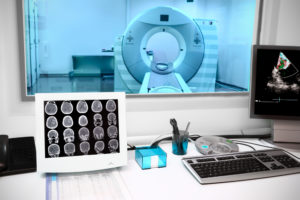 When you arrive at a doctor’s office with symptoms or concerns, they will always start by having an in-depth discussion with you. They’ll want to understand your symptoms, medical history, any inciting events like a car accident, and your goals for treatment. They may follow this up with a physical examination or some assessment tests. But when the answer is not obvious, or they want to rule out potentially serious issues, diagnostic imaging like MRI scans may become necessary to gain better information as to your condition. If it’s been suggested you go for an MRI, it can be comforting to understand what that means.
When you arrive at a doctor’s office with symptoms or concerns, they will always start by having an in-depth discussion with you. They’ll want to understand your symptoms, medical history, any inciting events like a car accident, and your goals for treatment. They may follow this up with a physical examination or some assessment tests. But when the answer is not obvious, or they want to rule out potentially serious issues, diagnostic imaging like MRI scans may become necessary to gain better information as to your condition. If it’s been suggested you go for an MRI, it can be comforting to understand what that means.
MRI Scans vs. Other Scans
When a doctor needs to see inside of your body for diagnosis, MRIs are not their only option. In fact, MRIs take a long time to perform and may not always be a doctor’s first choice. There are other benefits of an MRI vs. an X-ray and other imaging tests.
If you are most likely to have a bone-related issue, an x-ray may be preferred. X-rays are the fastest and most accessible form of imaging and do a great job showing issues like fractures, dislocations, misalignments, or narrowing of the joint spaces. However, they will not show very subtle bone injuries or any trouble with tissues or organs. X-rays may still be used if these conditions are suspected, in order to first rule out bone injuries.
CT scans, or computed tomography scans, offer a much higher level of detail through computerized 360-degree views of the internal structures. These scans are fast and detailed, making them ideal for emergency situations. A CT scan is usually called for when there is potential trauma like an organ or tissue injury or a pressing issue like a potential blood clot.
MRI scans differ from both x-rays and CT scans in that they do not use radiation to create images, but instead use a combination of magnetic fields and radio waves. An MRI can create highly detailed images of soft tissues, nerves, and blood vessels, with more detail than CT scans offer. However, the scans take a longer time to perform and may not be ideal in an emergency. An MRI can show things like spinal injuries, heart and blood vessel problems, and degenerative diseases.
Are MRIs Dangerous?
MRIs are a commonly used diagnostic imaging technique that are not dangerous on their own. Unlike x-rays and CT scans, they do not use radiation and do not risk exposure.
However, there are precautions taken during MRI scans due to the use of powerful magnets. You will need to remove any metal on your body, including piercings, glasses, or even pants with metal buttons. If you have implanted metal, like a pacemaker or cochlear implants, you will need to work with a technician to determine the best course of action. Some internal metal objects, like screws or wire mesh, may mean you cannot undergo an MRI. It’s important to disclose any potential obstructions before your scan.
Other people struggle with MRIs due to the confined nature of the procedure. Most MRIs involve lying still in an enclosed metal tube for upwards of 90 minutes and involve lying still or even being strapped down for the duration. If you are claustrophobic or may struggle with this, doctors can often prescribe anti-anxiety medication or sedatives to make the procedure less stressful.
Because MRIs do not use radiation, they are not contraindicated in pregnant women. However, if you are pregnant or suspect you may be, it is always a good idea to let your provider know and discuss your options ahead of time.
What Happens After an MRI Scan?
Unless you used any sedatives, you are usually able to walk away from an MRI and resume your normal daily activities. Because they are less commonly used in emergency situations, you can usually wait a couple of days to get your results. In the meantime, your doctor and a specialist, called a radiologist, will examine the images that the MRI scan generated in order to identify abnormalities or form a diagnosis. They will then call you to share the results, often showing you the images.
At AICA Snellville, our diagnostic imaging facilities are located on the premises, allowing technicians and doctors to work closely together on your diagnosis and treatment. You will be able to seamlessly have your MRI performed and receive results from an integrated team of specialists who are devoted to your recovery. Call us today to begin the process of healing!
